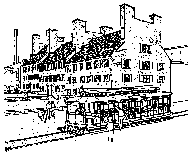 One of the rewards of having an inquiry mindset is that you never stop learning or wanting to know more. Knowledge is limitless and enthusiasm for a topic or issue can start with the smallest kernel of interest and grow into something much greater and purposeful. I have a tendency, as I've indicated in previous posts, to start to pull one research thread and end up unraveling much more, piquing my interest along the way and taking me into a deeper dive and in unexpected directions.
One of the rewards of having an inquiry mindset is that you never stop learning or wanting to know more. Knowledge is limitless and enthusiasm for a topic or issue can start with the smallest kernel of interest and grow into something much greater and purposeful. I have a tendency, as I've indicated in previous posts, to start to pull one research thread and end up unraveling much more, piquing my interest along the way and taking me into a deeper dive and in unexpected directions.When Becca Hunsicker, the 7th-grade history teacher, and I started talking about developing some elements of experiential learning and inquiry for the United States History curriculum, we were focused on the Folklore Fair. This work is ideally suited for inquiry. Students are asked to share a meaningful artifact or heirloom, interview a family member who has a connection to the piece and "dig in" to contextualize the artifact in a period of history. A high level of engagement is built right in. The inquiry focuses on their own family story. The students often find out more than they've ever known about their history and how it shaped their identity.
After visiting the Tenement Museum in New York, I was wondering how we could make the digital storytelling piece of the Folklore Fair part of our own museum and link it to immigration experiences in Providence. We were also trying to get the students in 7th grade out into Providence, learning that history happens every day and everywhere, right at our doorstep. We wanted them to experience the rich resources of the John Brown House, The Rhode Island Historical Society and RISD Museum and prepare them for the larger landscape of the Cityside experience in 8th grade. Then we hoped to move them along the Blackstone River to the Lowell Mills and the Museum of Work and Culture as part of their regional identity.
As we wrestled with a direction in which to take this curricular enhancement and to bring back some of the "place-based" work Becca had done in previous years our focus shifted to the Early National Period and the role Providence, Rhode Island, and New England played in establishing a national identity; keeping in mind the 7th Grade theme of "Be the Change."
Wanting to include inquiry-based and experiential learning as well as the immigrant experience, I stumbled upon this rich NEH summer program about Social Movements and Reform in 1830's New England. Thinking I was fairly well versed in the textile mills of New England having grown up in Northeastern Connecticut, this seemed like an opportunity to reinvigorate my interest in how immigrants became the workforce in textile mills and how this work became part of their identity. My own grandparents had come from Canada to be part of the textile industry in the early 20th century. The outsized mill buildings were situated on rivers where the force of the water was transferred as energy to drive the "state of the art technology," producing at its height tens of thousands of yards of cotton cloth.
What I hadn't expected to discover was the cross-disciplinary nature of this learning experience. The social reform movements of the period found a voice among the "mill girls;" young women in their late teens and early twenties, living independently for the first time and becoming a catalyst for change. In a broad sense, the United States, while still in the early stages of forging a national identity, had reached a moment in which reflection and reform could be part of the general discourse. Survival as an individual and as a country was no longer an immediate need as in previous generations. Due to industrial growth and the nation's economic security in the world, people from all walks of life began to consider the social inequities that persisted in a nation founded ostensibly on equality and freedom.
This experiential learning opportunity provided engaging experiences through literature, art, and science in a way that encouraged me to "dig in" with questions. How did the development of new technologies directly affect the cultures and communities that grew up around new industries? How did the newly formed government encourage innovation and what impact did innovation have on the economy, society, and culture? How does material culture help tell the stories of history? How did experiential learning influence this inquiry process? As Becca and I continue to develop place-based, experiential and inquiry-based learning opportunities for 7th Grade History students (with major kudos to Becca for the massive scheduling and planning challenge of these museum experiences!) the Summer Scholars work resonates as a rigorous example of how we learn through questioning and hands-on experiences while telling our stories as part of our identity. History is made every day, by everyone. Just ask the "mill girls" who contributed to "Lowell Offering." How did these young women become the voice of a reform movement as they learned to "Be the Change?"